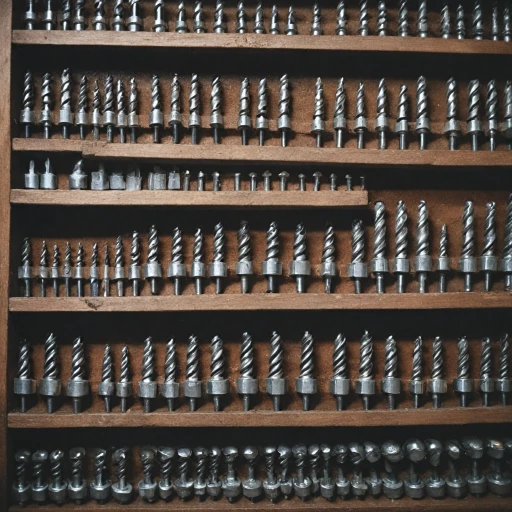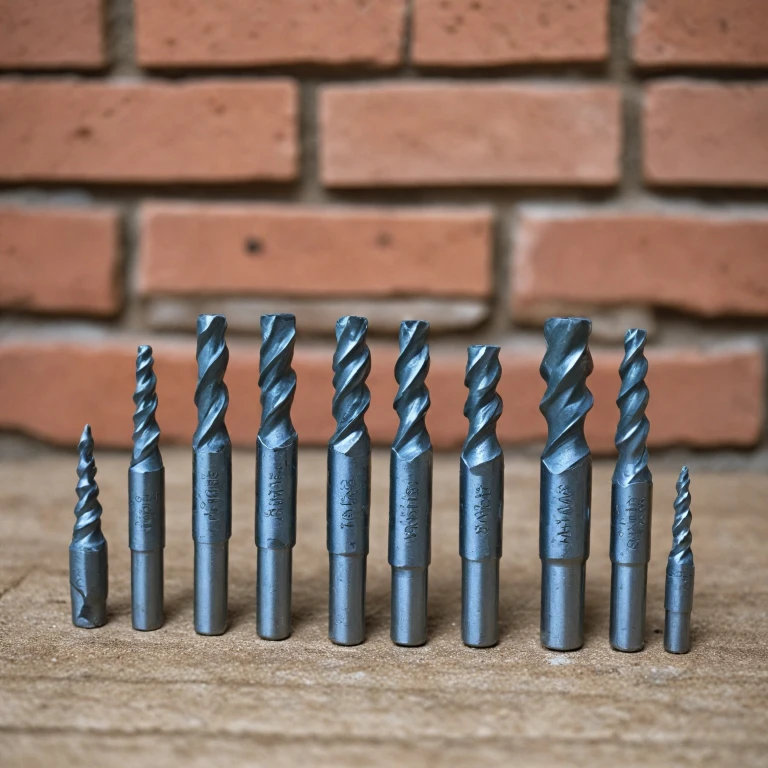What Are Masonry Drill Bits?
The Basics of Masonry Drill Bits
Masonry drill bits are essential for anyone looking to work with concrete, brick, or stone. These specialized drill bits are specifically designed to handle the tough, abrasive nature of concrete masonry and other hard materials. Typically made with carbide-tipped ends, these bits are built to endure high stress and provide precise drilling.
Using a masonry drill bit helps in achieving clean, smooth holes in concrete and similar surfaces. The carbide tip allows the bit to cut through tough materials with greater ease and efficiency. When paired with a hammer drill or an SDS rotary hammer, these bits become powerful tools that can navigate through concrete and masonry with minimal effort. This adaptability makes them a staple in both professional and DIY projects.
Given their robust nature, masonry drill bits come in a variety of shapes and sizes to accommodate different projects. From small diameter bits for precise drilling to large, max-sized bits for more significant penetrations, the choice can vary significantly depending on the requirements of the task at hand. Additionally, the length of the bit matters greatly when it comes to the depth of drilling required.
To understand more about the various roles drill bits play, you might find
this article on the role of drill bits in cordless drill sets useful.
While investing in a quality bit set can come with higher pricing, it ensures longer-lasting performance and better results in the long run. Your selected masonry drill bit's compatibility with your drill, whether it's a standard model or an SDS max variant, is critical to its successful use.
Why Choose Masonry Drill Bits for Cordless Drills?
Why Opt for Carbide Tipped Masonry Drill Bits in Cordless Drills?
When it comes to tackling concrete masonry or dense surfaces, choosing the right drill bits for your project can make all the difference. Here's why masonry drill bits are a logical choice to partner with your cordless drill set:
- Compatibility with Cordless Tools: Modern cordless drills, often equipped with hammer drill functions, seamlessly accommodate masonry drill bits. This compatibility allows you to take advantage of the maneuverability and convenience of cordless tools, ensuring effective performance even without direct power supply.
- Robust Construction: Masonry drill bits, particularly those that are carbide tipped, are engineered to endure the demanding conditions posed by drilling into concrete. Their construction enables them to efficiently handle the resistance encountered in dense materials, providing a cleaner and quicker drilling experience.
- Versatile Applications: Whether you are engaging in home improvement, construction, or DIY projects, masonry drill bits cater to a variety of tasks. These bits excel in applications involving concrete, rebar, and stone, and can be paired with an SDS rotary or hammer drill for optimal outcomes.
- Enhanced Drilling Efficiency: The shank item and sds max features available in some masonry drill bits minimize slippage, ensuring efficient power transfer from your drill to the bit. The friction reduction during operation can significantly extend the lifespan of your drill bit set.
- Reliable Performance: When working with concrete masonry, using a bit set designed explicitly for these purposes can optimize your productivity. With varied lengths, cut diameters, and features like a rebar cutter head, these bits consistently deliver reliable performance for your drilling roster.
Choosing optimal masonry drill bits is integral to realizing the full capabilities of your cordless drill set. For a detailed guide on selecting the ideal drill bit for your specific needs, view product insights at
choosing the right drill bit for your cordless drill set.
Selecting the Right Masonry Drill Bit for Your Project
Determining the Fit for Your Project Needs
Choosing the right masonry drill bit is crucial not only for the success of your project but also for extending the lifespan of your drill bit set. A well-chosen bit can efficiently tackle materials like concrete masonry and bricks, while an ill-suited one can wear out quickly or compromise your work quality.
When selecting a masonry drill bit, consider the following factors:
- Material Compatibility: Ensure that the bit you choose can handle the specific material you are drilling into. For heavy-duty applications like drilling into concrete masonry or reinforced structures with rebar, an SDS Max bit or a rotary hammer bit with a carbide tipped design is ideal.
- Drill Type: The type of drill you plan to use impacts your choice. For cordless drills, it's imperative to match bits that are compatible with the power output and chuck size of your drill. SDS rotary bits or hammer drill bits with a shank item designed for rotary hammer drills may provide a better fit for certain high-impact tasks.
- Length and Diameter: According to your project's depth and precision requirements, choose a bit item with the appropriate length. A longer bit may be necessary for deep holes, while a shorter one might suffice for surface drilling.
- Carbide Tipping: Bits with a carbide drill tipped cutter head are favored in masonry projects because of their durability and ability to maintain effectiveness when drilling into tough materials like concrete. The carbide material can withstand the friction and heat generated during drilling tasks.
- Pricing and Qty: Lastly, consider the pricing and quantity of bits you may need. For larger projects, purchasing a bit set that includes various sizes and types can be more cost-effective.
For a comprehensive understanding of which drill bits align best with your cordless drill, see this guide on
choosing the right drill bits for your cordless drill set.
Tips for Using Masonry Drill Bits with Cordless Drills
Maximize Efficiency with Proper Technique
When utilizing masonry drill bits with cordless drills, there are important techniques to follow in order to maximize efficiency and achieve the best results. Here are essential tips to keep in mind:
- Choose the Right Drill: Ensure that you are using a hammer drill or a rotary hammer for drilling into tough materials like concrete and masonry. These drills deliver the necessary impact and speed, unlike regular drills.
- Optimal Speed Setting: Adjust the speed of your cordless drill to a low or medium setting. This will prevent unnecessary wear on the bit and extend its lifespan within projects that involve harder materials.
- Correct Pressure Application: Allow the drill bit to do most of the work. Applying too much pressure can result in early damage to carbide tipped bits and can diminish the effectiveness of the shank design.
- Utilize the SDS System: When working with SDS max or rotary hammer drills, engage the hammer action to penetrate tough materials efficiently. This system securely holds the bit item, reducing slippage during operation.
- Cooling Down Your Bits: Periodically pause to allow the masonry drill bits to cool, specifically when drilling deep into concrete masonry. This prevents overheating and maintains the integrity of the cutter head.
- Avoid Reinforced Areas: Be cautious around rebar within concrete masonry. Using a dedicated rebar cutter or altering the drilling path can spare the bit and the drill itself from undue strain.
- Appropriate Length Selection: Select a masonry drill bit length that suits your project to avoid instability. Longer bits might wobble or bend, leading to inaccurate or inefficient drilling outcomes.
By adhering to these tips, you can effectively utilize your masonry drill bits with cordless drill sets, ensuring both duration and productivity. Keeping these practices in mind will not only prolong the life of your tools but also optimize your project's outcome by reducing time spent dealing with wear or improper drilling techniques.
Maintaining Your Masonry Drill Bits
Keeping Your Masonry Drill Bits in Optimal Condition
Maintaining your masonry drill bits ensures efficiency and extends their lifespan, especially when frequently used with a cordless drill set. For users tackling concrete, brick, or any hard surface, upkeep is crucial. Here’s a guide to help you preserve the quality of your drill bits:
- Regular Cleaning: After each use, clean your drill bit to remove dust and debris. Use a soft brush or compressed air to clear any particles lodged around the carbide tipped cutter head. This prevents dulling and helps maintain sharpness for precision drilling.
- Proper Storage: Store your masonry bits in a dry, impact-resistant case. Moisture can lead to rust, which affects the performance and may result in damage. Invest in a storage solution that accommodates various sizes, from SDS rotary to rebar cutter bits, ensuring every drill bit item remains in top-notch condition.
- Inspection for Wear and Tear: Regularly inspect your bits for signs of wear. Look for chipped carbide tips or a worn shank. Early detection allows for timely replacement, reducing the risk of injury or damage to your drill.
- Lubrication: Apply a suitable lubricant occasionally to moving parts of your hammer drill, especially if drilling into dense concrete masonry. This reduces friction and heat build-up, preserving the length and effectiveness of your masonry drill bit.
- Re-sharpening: Although masonry bits like SDS max are rugged, they may require re-sharpening over time. Consult a professional for this task, as improper sharpening can alter the cutting angle, impacting performance.
By adhering to these maintenance tips, users can maximize the durability and efficiency of their drill items. Regularly caring for your masonry drill bits ensures they are ready for any basic to complex project. Maintain these practices to keep your concrete masonry and other surfaces efficiently drilled, tackling every task with precision.
Troubleshooting Common Issues with Masonry Drill Bits
Addressing Frequent Problems with Masonry Bits
Drilling through materials such as concrete and brick can pose certain challenges, especially when using a masonry drill bit with a cordless drill. Here are some common issues and practical solutions to keep your project on track.
- Worn-Out Bits: It's common for masonry bits, particularly those with carbide tips, to wear down over time. You'll notice a reduced efficiency in drilling or a tendency for the bit to slip. Regular inspection and prompt replacement of worn bits will prevent damage to your drill.
- Limited Drilling Depth: If you experience limited penetration when using an SDS or SDS max masonry bit, check for blockages or debris on the cutter head or along the bit length. Keeping the bits clean ensures smooth and effective drilling.
- Rebar Obstacles: Encountering rebar while drilling through concrete can be challenging. Consider using a carbide-tipped rebar cutter or rotary hammer drill bit to navigate through these obstructions without damaging your drill item or bit.
- Overheating: Overheating is a typical issue when drilling for extended periods. Employ a proper lubricant and allow the bit to cool down by intermittently pausing your drilling activity.
- Inadequate Power: Cordless drills may sometimes lack the power needed for tough masonry tasks. Ensure your drill is fully charged, and consider using a hammer drill or masonry hammer core drill for added power.
By understanding these issues and integrating recommended solutions, you can optimize your cordless drilling experience even when faced with concrete masonry challenges. For further guidance on using your cordless drill effectively, explore our other blog posts.

